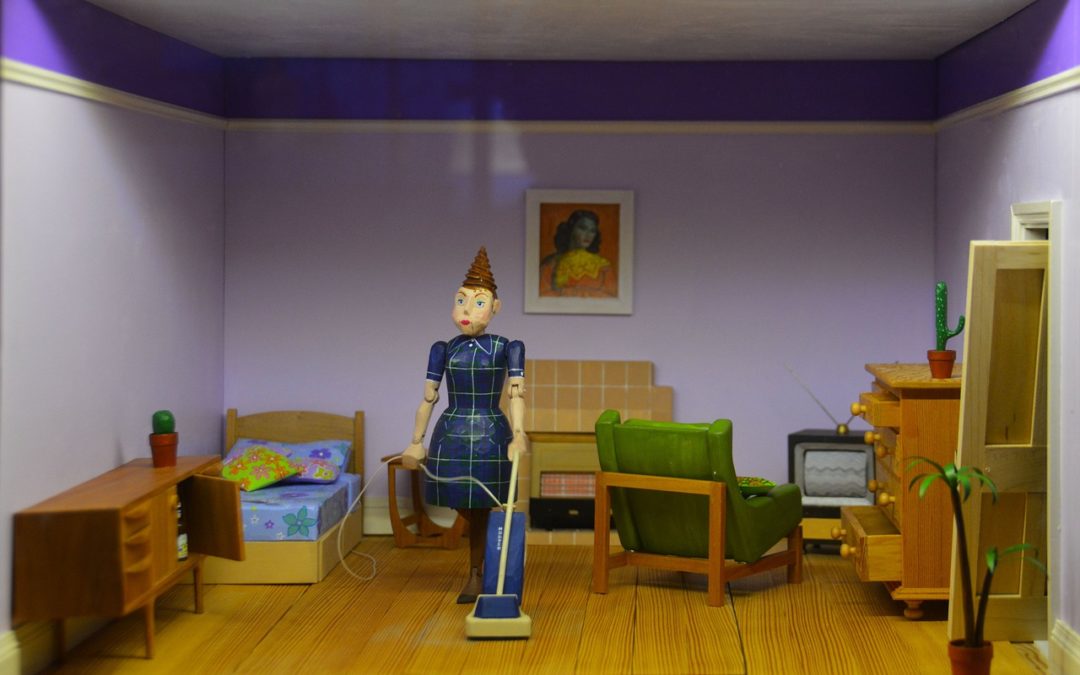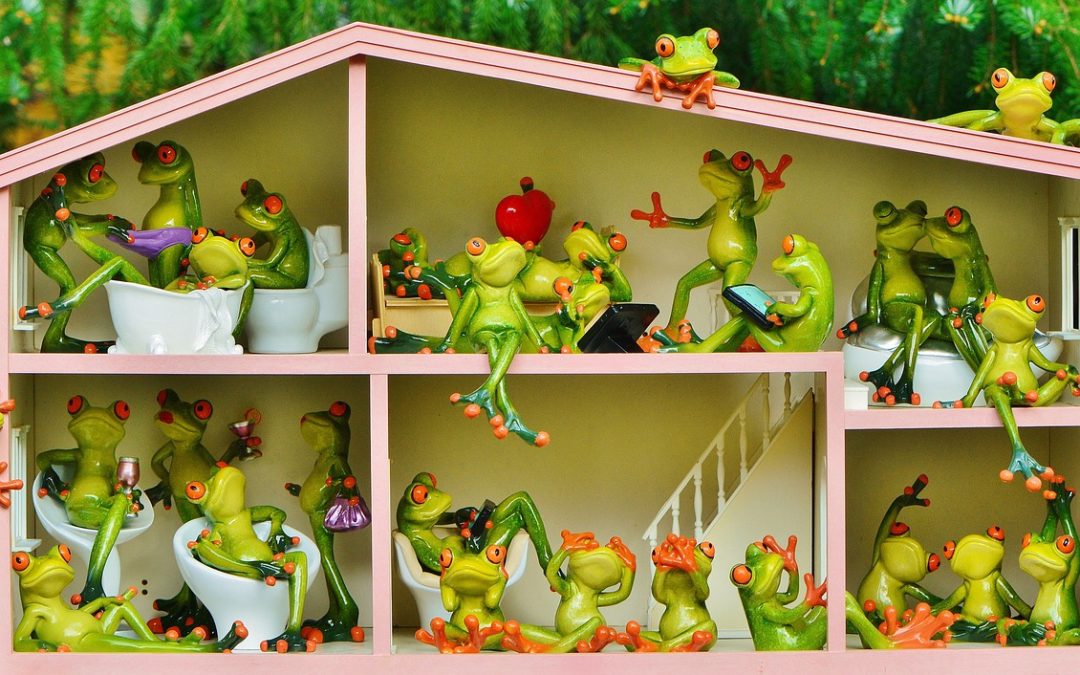
by admin | Jan 29, 2023 | Declutter
Frustrated by too many 'things' in our own home, I started to look at the themes of letting go, of discarding and living with less. The 'light switch' moment for me came when I was about to buy yet another book and realised the stupidity of doing so, and of how that moment started the conversation in my mind about doing the same or better with less possessions and better energy.
Let me tell you now about another trigger incident. This happened while searching online for people choosing to live fulfilling lives with less than they might have had before or for blog articles about frugal living and minimalism. Through such a search I found the perfectly named documentary "Minimalism" and sat down one evening to watch it. Produced by Matt D'Avella it explores the conversations and ideas discussed by friends Joshua Fields Millburn and Ryan Nicodemus.
In looking at this I felt as though I were discovering for myself a previously hinted at, but largely unknown, life space occupied by people who have turned their back on consumerism and instead questioned what they need to live well and to live happily. If Consumerism is the mass wave of being swept along in buying the latest iPhone, or fighting - sometimes literally - for the best deal at a store opening on Black Friday, then the opposite of this is making what you have last longer and being in a place where the same amount of money now buys you more of what you will appreciate and preserve.
I was struck by the stories of different people within the programme and how they had come to a decision based on the stress and fear they were experiencing in what they had previously deemed a normal life along with those of their friends. A broker who had trained and studied to achieve good major in Finance and Accounting at university to become a well paid young professiona, had worked for many years and given himself to his company. One December day he was told by his boss that he was going to be offered a partnership in the firm after Christmas. The man had received this news and then gone back into his office and started crying. His moment of clarity came from realising that if he accepted this promotion he would then be caught up in a place of never after being able to walk away from the trappings of the higher salary and options, of the politics and status of the role. That same evening he packed up his things from the office and left the building, committed to creating his own freedom by living a life that would be more meaningful to himself.
In another example from the "Minimalism" documentary, a lady was diagnosed with MS and faced the shock of this. Her energy levels were down and her ability was hampered by know being able to predict how she would feel from one day to the next. She identified that a lot of her stress was in the clutter she felt around her possessions and she considered how she might reduce the volume of 'stuff' in their home. Pulling out her favourite clothes first, she began to gift to throw away the items she was not using and didn't like. She identified 33 items of clothing that she kept and, as a trial with herself she began to mix and match those clothes for the next three months at work. No one at her workplace noticed she had massively reduced her wardrobe. Together with her husband, she continued with the experiment, letting go of so many of their non-essential items. They created new options for where they could live, her MS waned and became completely manageable.
Another character is a man in his twenties who has reduced his belongings to 51 items that he can pack into just two bags, a weekend shoulder bag and a laptop bag. The freedom of living with so much less, just these essentials, allows him to work from different places around the world as he chooses. This has been achieved by letting go of so much of the accumulated baggage which we surround ourselves with.
The minimalists are sharing a message that it is better to lead a life where you can rely on far less money because that money will go so much further when spent on items that are durable, and which of course you love and appreciate. When you can cut your cost of living, but still maintain or enhance that standard of living, you are in a good place. Decluttering and realising what you no longer need is a part of the process of becoming free and gaining greater happiness and contentment with your life.
If you were to be able to make a career change or move to an area that you would love to love in, and you could do this through adjusting your clutter level, where would you be going?
Having considered such a move, what do you think you can do in order to make this a reality?
What will you need to let go of in the process of getting ready for the change of circumstances?

by admin | Jan 15, 2023 | Declutter
What do you do with the space and how do you use the rooms in your home? Are you living with clutter, or do you have just enough in each of the spaces that you live within? How well are you using your space at home?
For us the crunch point came when we looked at what we were paying to live in the house versus what pleasure we got from the amount we were paying. It seemed like most of what we paid for rent, light, heating was actually paying for the 60% or more of the possessions we had with us but which we never used. This started us off on a path to finding a new house with the same number of rooms but less space, a better garden outside and the shedding of our possessions in order to make the move to the new home that was a better match to our plans. We could buy a home for less than we had been paying in rent, and provided we worked out a plan to let go of some of our clutter, could be comfortable and enjoy life in the new place at a lesser cost than before.
The 'Tiny Home' movement has triggered great interest for the idea that you can live in a space which is enjoyable because it is so functional, forcing you to look at what space is necessary to enjoy a fulfilling home life. Log onto any channel and search for shows that illustrate how someone has created a fixed tiny home or a mobile and towable tiny home built and deigned to their own personal perspective on what constitutes good living on a defined budget and within set guidelines for usage of space. In one show I found an architect who designs tiny homes for his clients. He personally chooses to live in an live in an off grid trailer unit that can be towed by a vehicle to an alternative site when he chooses. It has a double bed, kitchen, fold down dining table, wifi, solar panels on the roof, a shower room and toilet, shelves for his favourite books. It has good headroom and eaves storage. He can hook up the tiny home and move it across the city or he can take it across the country. He has his home in one space that gives him the essentials of what he needs to live well.
A tiny home may not be what you need, but understanding the idea that you are free to live where you want with what you choose, this is liberating and will encourage you to find new solutions to the space you live with. The family homes we buy and rent these days are significantly larger than the same family focussed houses that were being built and sold forty or more years ago. We are demanding more space and more facilities in buildings that we make proportionately less use of than our parents and grandparents.
Garages are used primarily for storage of clutter rather than for the storage of a vehicle. Rarely are they spaces where we keep our workshop and tool collection. Instead we use such skills less and pay other people to do the repair work for us. The lack of knowledge over how to maintain a house comes at a financial cost. There has been a vast growth in self-store facilities where people pay to have someone else to store their sealed boxes. Often times there is a correlation between people deciding to stop paying for long-term storage and their realisation upon collecting the boxes of items, that the things they have stored were not worth the money spent for that same storage hire.
The mortgage industry and the real estate industry work closely to continue their lending and construction. Rather than buy the home space we need and which is enough for us, the mortgage process is focussed on "How much can I borrow, and what can I get for the deposit monies I have raised?" The construction company or home developer wants to sell you the largest feasible unit, which serves to lift the profit per property that they offer to the market. This is a far cry from the common sense approach that says "What space will suit us to live comfortably and without financial burden or pressure?" The second way of looking at buying a home still allows us to pay down the loan as fast as possible in order to be without debt in those later years when our earning ability is reduced.
It is better and less stressful to lead a life where you can rely on far less money because that money will go so much further when spent on items that are durable, and which of course you love and appreciate. When your cost of living drops but you maintain or enhance that standard of living, you are in a good place. Decluttering and realising what you no longer need is a part of the process of becoming free and gaining greater happiness and contentment with your life.

by admin | Jan 6, 2023 | Simple Self Help
Having been a salesperson for years I learned early on that if people don't buy from me there is another person waiting for my call. I used to have a terrible time in sales and life success until I realised this point.
In my first weeks out of university, knowing that I wanted to be around people and liked the principle of selling, I managed to get myself an interview with an office equipment company. I passed this and ended up being out on the road with my company car and sample machines. I felt physically ill sometimes trying to book appointments and then trying to sell a machine once I was in the appointment. However, once I could separate the fear of rejection from the process of selling, life and my work became a lot simpler.
One of the reasons it became simpler, was that I realized that selling office products was not what I wanted to do, and I found other products and offerings I felt a better connection to. The other reason - and the one that was the most important in terms of feeling good about myself - is that I grasped the concept that it was a numbers game as well as being about relationships. By putting more effort into learning better skills with people, as well as stepping away from situations that were unprofessional, I began to enjoy the selling industry. I also started to get better results because I was focusing more on what the prospects wanted than on what I had done before, which was to make them want my product.
Often they were as keen to find someone to listen to them and to be able to hear the problems they were facing. If I had a solution for their issues, even better! Where there was simply no common ground between us, no mutual reason for being in contact with each other, then as soon as I let go of the need to feel liked or appreciated, the pain was gone. Either there was a working opportunity to do some thing or there was not, and no amount of being nice or wanting to be liked would make any difference at all.
This is true for life principles in that regardless of whether you are suggesting an opportunity, building a friendship, developing a network, or simply getting through your day, you are bound to be in contact with people you just cannot relate to. The fact that they feel the same is nothing to be concerned about.
Just find someone who either likes you and what you have to offer, or someone who just likes the offer because it is what they need and have been looking for. Either way you win. Both of you.

by admin | Jan 1, 2023 | Declutter
In exploring our own situation of a house filled with 'stuff' and all the emotional issues I felt around these possessions I started to look at the themes of letting go, of discarding and living with less. You have read about the 'light switch' moment when I was about to buy yet another book and realised the stupidity of doing so, and of how that moment started the conversation in my mind about doing the same or better with less possessions and better energy. Let me tell you now about another trigger for me.
I searched online for people choosing to live fulfilling lives with less than they might have had before or for blog articles about frugal living and minimalism. Through such a search I found the documentary called "Minimalism" and sat one evening to watch it. Produced by Matt D'Avella it explores the conversations and ideas discussed by friends Joshua Fields Millburn and Ryan Nicodemus. In looking at this I felt as though I were discovering for myself a previously hinted at, but largely unknown, life space occupied by people who have turned their back on consumerism and instead questioned what they need to live well and to live happily. If Consumerism is the mass wave of being swept along in buying the latest cellphone, or fighting - sometimes literally - for the best deal at a store opening on Black Friday, then the opposite of this is making what you have last longer and being in a place where the same amount of money now buys you more of what you will appreciate and preserve.
In one example from the "Minimalism" documentary an architect who designs tiny homes talks about his lifestyle, the choices he has made and the freedom he considers he has from living with less. He lives in an off grid trailer unit that can be towed by a vehicle to an alternative site when he chooses. It has a double bed, kitchen, fold down dining table, wifi, solar panels on the roof, a shower room and toilet, shelves for his favourite books. It has good headroom and eaves storage as well. He can hook up the tiny home and move it across the city or he can take it across the country. He has his home in one space that gives him the essentials of what he needs to live well.
Within the same programme is an interview with a man in his twenties who has reduced his belongings to 51 items that he can pack into just two bags, a weekend shoulder bag and a laptop bag. With just these items he lives a very flexible life, able to work from different places around the world as he chooses, precisely because he doesn't have the baggage that we surround ourselves with in everyday life. He doesn't have the burden of living in one place, can earn money and pay rent where he chooses, visit fiends nationally or globally and still maintain what - for him - is a lifestyle he can enjoy.
We are demanding more space and more facilities in buildings that we make proportionately less use of than our parents and grandparents. Garages are used primarily for storage of clutter rather than for the storage of a vehicle. Rarely are they spaces where we keep our workshop and tool collection. Instead we use such skills less and pay other people to do the repair work for us. The lack of knowledge over how to maintain a house comes at a financial cost. There has been a vast growth in self-store facilities where people pay to have someone else to store their sealed boxes. Often times there is a correlation between people deciding to stop paying for long-term storage and their realisation upon collecting the boxes of items, that the things they have stored were not worth the money spent for that same storage hire.
I went through much the same thing when, for a two year period following my divorce, I placed a lot of things in the local self-storage depot. The storage cost was nearly a thousand dollars. When I finally collected the items I had been storing I threw away almost 90% of them. The whole exercise had been a knee-jerk reaction to moving from a large family house to a small space just for my own use and I had not thought it through. It would have been more cost effective to give away what was predominantly clutter, instead of paying a company to place it in a locker unit for me!
The access to cheaper materials and fabrics from the developing world, and the low cost of labour in such producing marketplaces, has allowed us to see disposable or low wear clothing as more affordable than nutritious food. The cost to the planet of the energy required for the creation and global distribution of this level of production has massive consequences. The minimalists are sharing a message that it is better to lead a life where you can rely on far less money because that money will go so much further when spent on items that are durable, and which of course you love and appreciate. When you cost of living drops, but you are able to maintain or enhance that standard of living, you are in a good place. Declutter and realise what you no longer need. This is the way you become free and gain greater happiness and contentment with your life.



